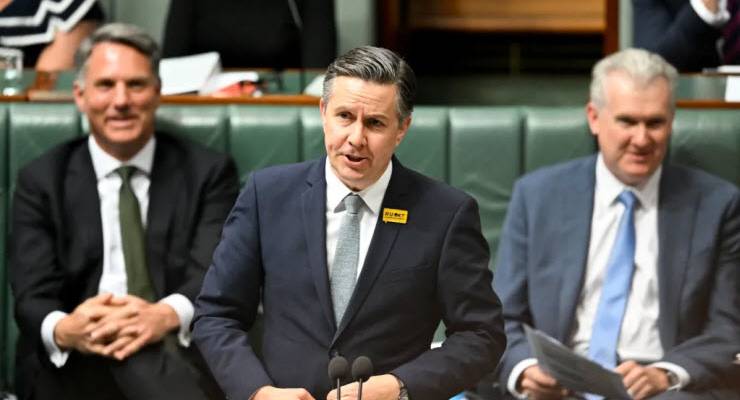
“Many current and former staff expressed deep distress about their experience at the commission — some even reported anxiety, depression or suicidal ideation in discussions. A number broke down during the meetings with investigators.”
Those are the bleak words used to describe the unique workplace hell of an agency that is supposed to advocate and augment support for people with mental health issues, but instead appears to have devolved to a state where its own staff were being harmed amid an executive culture preoccupied with issues management and external appearances.
In a report that was never going to be pretty, but has come out looking like a horror show, the review of the National Mental Health Commission (NMHC) set rolling by Health Minister Mark Butler will now almost certainly result in the agency being rebuilt from scratch because of woeful or almost non-existent governance in many areas.
The investigation and report were put together by Adjunct Professor Debora Picone AO supported by Adjunct Professor Karen Crawshaw PSM, with consultancy EY handed the job of undertaking “a functional and efficiency review of the commission”, according to Picone’s handover note.
On Monday, the most recent chief executive, Christine Morgan, was confirmed as having left the organisation after having voluntarily stood aside as the review took its course.
The NMHC investigation, published by The Saturday Paper, was triggered by allegations of bullying, psychological harm and questionable governance by staff. The Mandarin subsequently revealed a raft of NMHC communications contracts were let to a company run by former Liberal Party campaign staff and ex-lobbyists for the gambling industry.
“Throughout the investigation, many staff consistently noted that a predominant aspect of the culture and modus operandi of the commission is the focus on external communication,” the investigation report said.
“The view was strongly expressed by the chief executive and some others that the balance of communications, engagement and other activities has been appropriate in recent years, given the pandemic context, the then-government’s priorities, and the executive order establishing the commission.
“However, many other staff and some stakeholders expressed the opinion that the level of focus on external communications occurred at the expense of delivering the commission’s core objectives and policy initiatives, particularly the delivery of core accountabilities such as the national report.”
The report found there wasn’t anything immediately worthy of upward referral but that things were getting pretty ripe.
“Neither the investigators, nor EY, found any evidence of fraud or maladministration. It is fair to note here that some procurements and corporate travel were the subject of detailed and thorough independent investigation in 2022, where no conduct that constituted actual fraud or maladministration was substantiated, but where the relevant investigator did comment upon very poor conflict of interest management in the procurement of certain communications-related services and the critical need for improvement,” the report said.
“This in turn has led to remedial action with the recent development and promulgation of a new policy on managing conflicts of interest.”
The downward spiral
From there it all goes downhill, though the report stresses “any findings go to organisational matters only” and that “we make no adverse findings against any individual”.
“Many staff reported claims of matters that would fall under the category of a psychologically unsafe workplace, citing examples of poorly controlled psychosocial risks such as a disempowering authorising environment and lack of devolved budgets, lack of role clarity, poor internal communication of key strategic directions and resource allocation decisions, and a lack of cohesion and unity of the commission’s executive.”
The key output of the agency is the annual national report on mental health and suicide prevention, last published in 2021, with the 2022 edition still not produced and the agency chalking up a “projected departmental net operating loss of $6.2 million for the financial year 2022-23”.
Aside from being broke, day-to-day management looks a little too free range for the investigators: “In the recent history of the commission, there has been little formality in executive management processes such as meetings with structured agendas and regular performance reporting. The current chief executive indicated that this lack of formality predated her appointment to the role.
“She also indicated her preferred approach is one of shared executive responsibility for critical decisions of the commission, and reliance on the executive to communicate decisions and their rationale to their teams.”
The board you have when you don’t have a board
The NMHC’s advisory board, appointed by the government, is also an enigma.
“Whilst it is termed a ‘board’, the advisory board does not have any formal or statutory governance responsibility for the commission,” the report said. “The use of the term ‘board’ can tend to be a source of confusion both internally and with stakeholders about this body’s role, and some review of the ‘board’ nomenclature may be useful.”
And getting on the non-board is somewhat osmotic: “There is no expression of interest process to support the government in transparent selection of advisory board members. Nor is there a clear and transparent published outline of the specific range of skills, experience and capabilities in different domains sought, although an unpublished skills matrix, developed in consultation with the commission, is used by the department to guide advice to the minister regarding selections.
“Evaluation of advisory board effectiveness is also important and the investigators have been advised that this has not occurred, at least in recent years, despite it being required as part of the advisory board’s charter and operating principles.”
Conscious un-management
Project management is not so much a black box as a black hole.
“Implementation of major projects and initiatives appear to encounter delays and take a long time, with a lack of discipline around progress reporting in terms of milestones and budgets,” the report says, noting a program management office would be useful.
The NMHC’s move to create a role for someone with lived experience of mental health issues also didn’t work out. “The personal experience reported by the inaugural lived experience director was disappointing,” the report said, observing they left after just 15 months. “The inaugural director felt the role in practice was not given the authority or suitable recognition of their expertise that they had expected from the statement of duties for the role.”
Then there’s the issue of attracting and keeping staff. Having money to pay them is a good starting point: “There have recently been staff reductions as a result of not renewing non-ongoing roles owing to the current budgetary overrun. Given the nature of these reductions, they have not occurred as part of a considered structure. Many staff have also recently left. The commission’s structure appears to be quite ‘top-heavy’.”
Staff also have concerns about “role clarity, and that their stated roles do not always match the reality of what they are doing”.
“Given the above, immediately reviewing and streamlining the commission’s overall organisational structure is required,” the report said. Pity the public service (APS) is cutting back on consultants.
Sounds like a plan…
Of course, when you’re understaffed, the work piles up, with the report noting significant wheel-spinning in that “staff workloads were made more onerous by the inefficiency of some systems and processes, duplication and rework, which all led to significant resource and capacity waste”.
One of the most staggering observations is filed under “governance, strategy and delivery capability”.
“It is unclear how the commission’s vision is translated through organisational strategy to inform structures, work plans, program plans, priorities, resource allocation, workforce planning, performance measurement, and reporting,” the report said.
“The commission has a corporate plan, but does not have current strategic, or annual work or business plans, although work is under way at the commission to expand and strengthen the commission’s planning activities.”
To fix this, the report specifically recommended having a plan and that:
“As a matter of urgency, the commission should:
- finalise the development of the corporate plan 2023-27;
- develop a work plan for 2023-24;
- develop program plans with budget allocations according to 2023-24 portfolio budget statement outcomes.”
It’s awkward
Despite, or perhaps because, feedback given to investigators was not formalised in the workplace, the buck will now stop with the minister rather than heading for further investigations or a star chamber. But it’s a pretty close shave.
The biggest tragedy is that poor mental health continues to claim lives, and deaths are often preventable if there’s an effective, cohesive and caring approach to addressing an illness that is still in the infancy of clinical understanding and statistical documentation. The NMHC was meant to be the catalyst for that.
This is what the investigation report had to say about the formalities or lack thereof:
“It should be noted that no specific individual complaint of bullying or alleged breaches of clause 3 of the APS code of conduct (an APS employee, when acting in connection with APS employment, must treat everyone with respect and courtesy, and without harassment) for referral for further action, was raised with the investigators.
“The investigators sighted reports of a preliminary inquiry and code of conduct investigation of an alleged breach of clause 3 of the code which was ultimately not substantiated. There has been no evidence before the investigation of substantiated cases of bullying or breaches of the code of conduct over the five-year time period specified by the investigation team in its call for information.
“Nonetheless, some statements made to the abovementioned preliminary inquiry, and meetings between the investigators and some staff, included reports of suboptimal, dismissive or uncomfortable interactions with some (not all) in the executive inconsistent with a harmonious workplace.”
The report was clear that things were bad, but not so bad they needed to be referred up the chain: “It is important to state that the investigation did not find any substantiated evidence of maladministration or evidence of conduct that would warrant referral for further attention … The investigation did not receive information that would substantiate a finding of bullying or which would warrant further attention.”
The opposition will be steering well clear of this one, that’s for sure.
This piece was first published by The Mandarin.








So a commission has spent almost 7 million dollars to achieve nothing. Imagine how much could have been by giving this money to organisation actually working with mentally ill people
I’m surprised they found it at all.